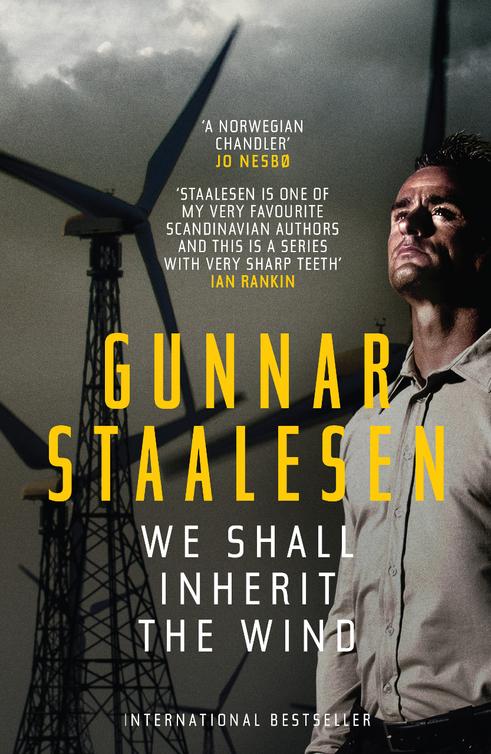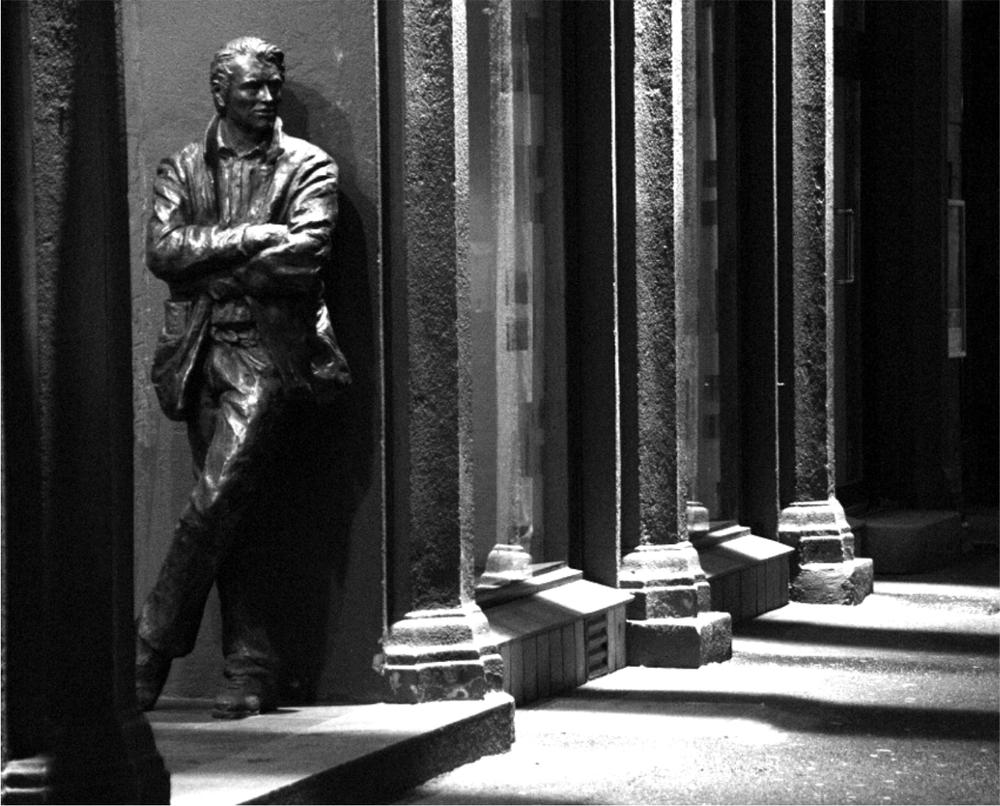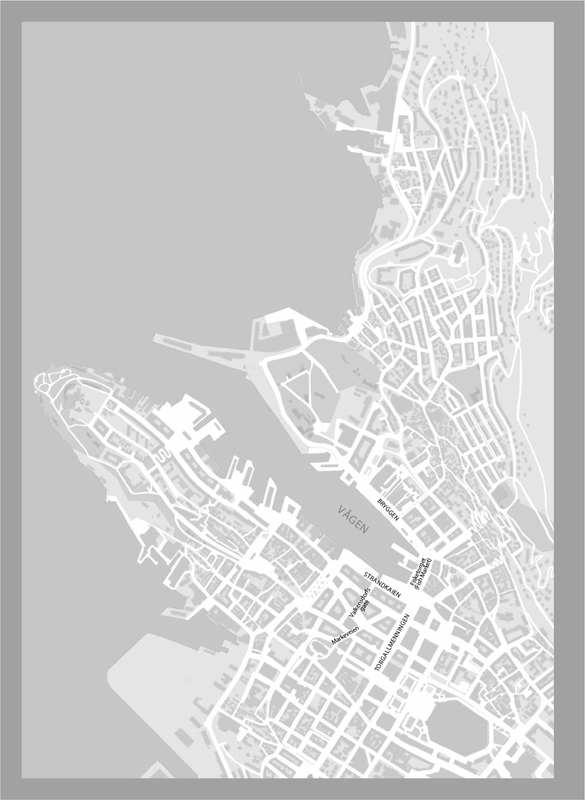We Shall Inherit the Wind
Read We Shall Inherit the Wind Online
Authors: Gunnar Staalesen



PRAISE FOR GUNNAR STAALESEN
‘Gunnar Staalesen is one of my very favourite Scandinavian authors. Operating out of Bergen in Norway, his private eye, Varg Veum, is a complex but engaging anti-hero. Varg means “wolf” in Norwegian, and this is a series with very sharp teeth’
Ian Rankin
‘The Norwegian Chandler’
Jo Nesbø
‘One of the finest Nordic novelists in the tradition of Henning Mankell’
Barry Forshaw,
Independent
‘Staalesen’s mastery of pacing enables him to develop his characters in a leisurely way without sacrificing tension and suspense’
Publishers Weekly
‘Gunnar Staalesen was writing suspenseful and socially conscious Nordic Noir long before any of today’s Swedish crime writers had managed to put together a single book page … one of Norway’s most skillful storytellers’
Johan Theorin
‘The Varg Veum series stands alongside Connelly, Camilleri and others, who are among the very best modern exponents of the poetic yet tough detective story with strong, classic plots; a social conscience; and perfect pitch in terms of a sense of place’
EuroCrime
‘Norway’s bestselling crime writer’
Guardian
‘An upmarket Philip Marlowe’
Maxim Jakubowski,
The Bookseller
‘In the best tradition of sleuthery’
The Times
‘Hugely popular’
Irish Independent
‘Among the most popular Norwegian crime writers’
Observer
GUNNAR STAALESEN
Translated from the Norwegian by Don Bartlett

If you go in search of Brennøy, in Gulen, on the map, I’m afraid you will be disappointed. This place and all the characters in the book are products of the author’s imagination and do not exist in reality. But you won’t need to look far for plans for wind turbines, not in Gulen or anywhere else …
They say a dying man sees life passing before his eyes. I don’t know. I haven’t died that many times yet. But I do know it happens if you have the misfortune to sit beside someone on their death bed.
I sat at her side in Haukeland Hospital, looking at her battered face, the needles in her arm, the probe in her nose, the tube in her mouth and the oscillating lines on the screen above her bed, which showed her heart function, blood pressure and the oxygen content of her veins, and I felt as if I were watching a stuttering amateur film of the years we had known each other, played on a somewhat antiquated projector I had never quite been able to focus. But then I was no technical whiz. I never had been.
I met Karin Bjørge for the first time in early 1971, when I was still working in social services. She was shown into my office by Elsa Drage. Drage is Norwegian for dragon, but she was the nicest one I had ever known. At that time Karin and I were both considerably younger – neither of us a day over thirty. Siren, her sister, was fourteen and it was because of her that Karin had come. She and her father had been searching for Siren for days. They had contacted the police, who had put her on the missing persons list, but as no unidentifiable body had been registered and there was nothing, initially, to suggest anything criminal had happened, they had not been able to make any promises. ‘But Dad’s got a bad heart,’ Karin said to me, ‘and my mother keeps fretting and fretting … that’s why I’ve come to you, to find out if you can do something.’
By ‘you’ she meant the social services’ Missing Children Department; and in fact we were able to help her. I found Siren three times in the course of the next two years. The first time I had to go to
Copenhagen, the second to Oslo. The third she settled for our very own Haugesund. On the last occasion she was so debilitated by dope and sexual abuse that she couldn’t even be bothered to escape. A psychologist we used at the time, Marianne Storetvedt, did a great job on her; we got her into a young people’s psychiatric clinic, and when Siren was discharged six months later, she appeared to be fine again.
Out of gratitude for my efforts, Karin invited me for coffee and cake, and as I left we gave each other a hug. Seemingly by happenstance, we turned to face each other, and for a few seconds we kissed, as lightly and tentatively as teenagers doing it for the first time. However, I was still married to Beate, and I had no idea what Karin had up her sleeve. At any rate, nothing came of this until twelve or thirteen years later, when I had taken my leave of social services, set up my own private investigator’s office in Strandkaien, by the harbour, and when, once again, Siren had gone missing.
In the interim, I had been in regular contact with Karin, who was working at the National Registration Office. In a moment of exuberance she had promised me that, if I ever needed any help, all I had to do was ring, which I did. Often. Sometimes, perhaps, to excess. She had been married for a short while, but when I met her again in 1986, the marriage was over, after less than a year. She never told me what had happened, even though we stumbled into a relationship in the summer of 1987, without putting up much resistance, a relationship that had lasted until now – and was still ongoing, for as long as the doctors could keep her alive.
I leaned forward, studied the vibration under her closed eyelids, listened to her faint breathing, felt her pulse at the side of her neck. Her skin was soft and warm, as though she were merely resting. I ran a finger down her face, from her scalp to her pronounced chin and out to her cheek. Inside me, the pain and turmoil were bursting to be released.
Every year we had celebrated each other’s birthday in cosy intimacy, hers on the nineteenth of March, mine on the fifteenth of October. We had each kept our own flat, but the nocturnal visits had increased over the years. We had hiked through Rondane and Jotunheimen, staying
in cabins; we had driven all over the south-western coastal region of Norway; and we had spent occasional long weekends in cities such as Dublin, Paris, Berlin and Rome. In Rondane, we had conquered the rocky mountain pass known as Dørålsglupen, both from the north and the south, and, a couple of days later, eaten trout sautéed with sour cream at the Bjørnhollia tourist cabin. In Jotunheimen we had slept in bunks at the self-service Olavsbu cabin before following the Mjølke valley down to Eidsbugarden and eating a proper gourmet meal in Fondsbu. In Dublin she had taken me somewhere that looked like the place where all books went when they died – the old library at Trinity College. In Rome, we had cuddled up on a bench on Mount Janiculum and watched the sun set over the city, before slipping through the side-streets down to Trastevere and enjoying a crepuscular repast at one of the restaurants there. But above all else we had been each other’s lodestar in our hometown, Bergen, the city between the seven mountains. For each other we had been somewhere to go for a hug when life became too depressing, when the National Registration Office was on the move again and the view from Strandkaien 2 was sadder than last year’s snow.
After I was shot in Oslo four years ago we became closer. She had jumped on the first plane and sat at my bedside for several days, as I was now sitting at hers. Later I had often thought it had not been so much the doctors’ efforts but her mental strength that had pulled me through. Had it not been for her, I might already be history. Things had come to such a pass a few weeks ago – at the back-end of summer – that I had said to her: ‘What if … if one sunny day I were to ask you to marry me, what would you answer?’ She had looked at me with an amused glint in her eye and said: ‘Tell me, Varg. Would you be proposing now?’ And I had answered: ‘Maybe …’ She had kissed me gently and whispered: ‘Were you to do it, I would probably take you at your word …’
Now she was lying here on her death bed. And it was all my fault.